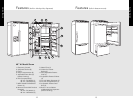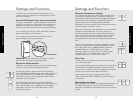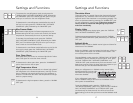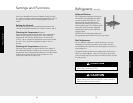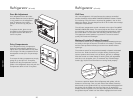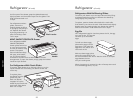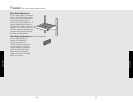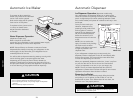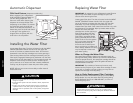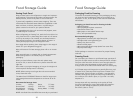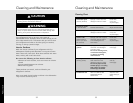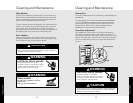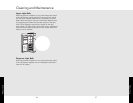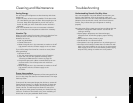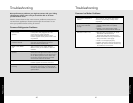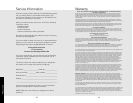
39
Product Care
38
Product Care
Cleaning and Maintenance
Saving Energy
You can help your refrigerator use less electricity with these
simple tips:
• Open the door as few times as possible. Think about what
you need before you open the door. Get everything out at
one time. Keep food organized so you will not have to
search for what you want. Close door as soon as food is
removed.
• Do not overcrowd the unit so air movement is blocked.
• Do not set the unit to temperature colder than necessary.
Vacation Tip
When you will be gone from home a short time (less than four
weeks), there is no need to shut off your refrigerator.
However, be sure to:
• Use any perishables.
• Freeze other items.
• Raise the signal arm in the automatic ice maker to the off
(up) position and shut off water supply to the ice maker.
If you will be away from home for a month or more, follow
these guidelines:
• Remove all food.
• Turn the power disconnect switch to the off position.
• Clean the unit and door gaskets according to the
“Cleaning and Maintenance” section on page 33.
• Prop doors open with rubber or wood blocks so air can
circulate inside. This will keep odor and mold from
building up.
• Raise the signal arm in the automatic ice maker to the off
(up) position and shut off water supply to the
ice maker.
Power Interruptions
If electric service to your refrigerator will be interrupted for 24
hours or less, keep the doors to the freezer closed. This helps
food stay frozen.
If service will be interrupted longer than 24 hours, remove all
frozen food and store it in a frozen food locker, or place two
pounds of dry ice inside the freezer for every cubic foot of
interior volume. This will keep food frozen for two to four
days. Be sure to wear gloves to protect your hands from dry
ice burns. If neither a food locker or dry ice is available, you
should use or can your perishable food at once.
Troubleshooting
Understanding Sounds You May Hear
Your new refrigerator may make different sounds than your
old one. Hard surfaces, such as the ceilings, walls, and
cabinets around the unit can make these sounds seem louder.
However, these sounds are normal and will soon become
familiar; they indicate that your refrigerator is working
properly.
Here are some of the noises you may hear and what they are:
• Freezer or refrigerator fresh food fan: sounds like air
rushing or whirling
• Sealed system (evaporator and heat exchanger)
refrigerant flow: sounds like gurgles, pops or boiling
water
• Defrost heater: sizzles, hisses or pops
• Condenser fan: air rushes and whirls
• Compressor: has a high pitched hum or pulsating sound
• Ice maker valve hookup: buzzes when ice maker fills with
water. This occurs whether or not the unit is connected to
water supply. If the unit is not connected to water supply,
stop sound by raising ice maker arm to off position.



